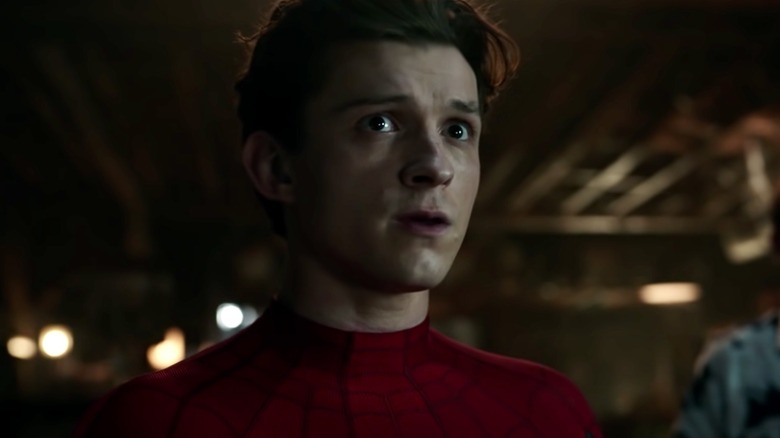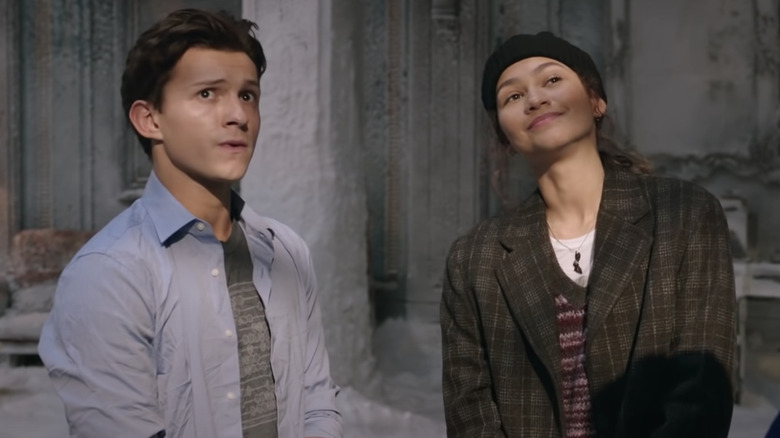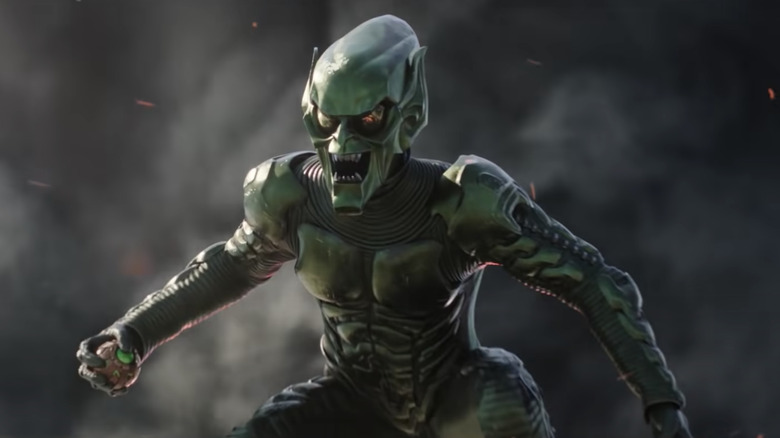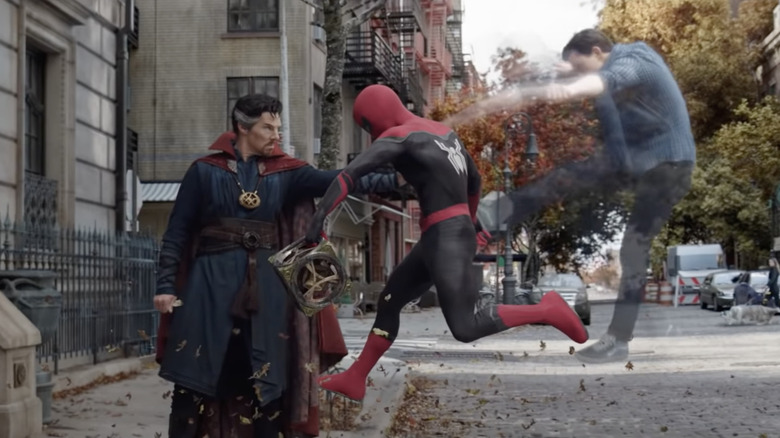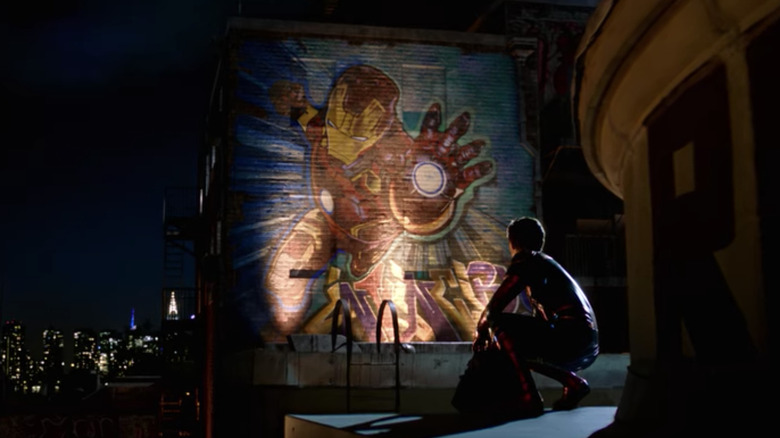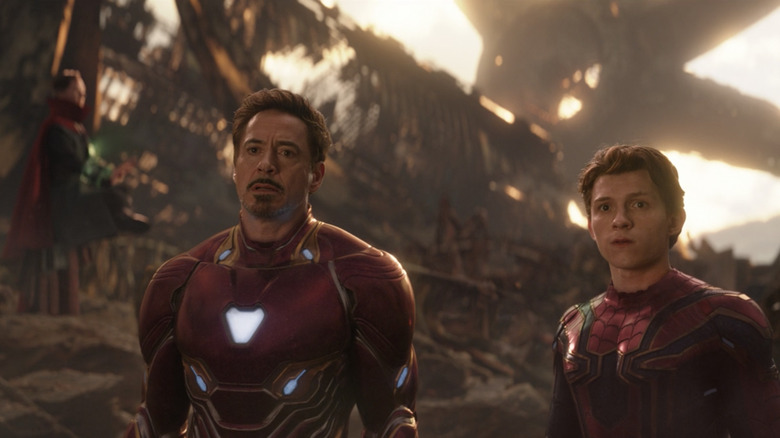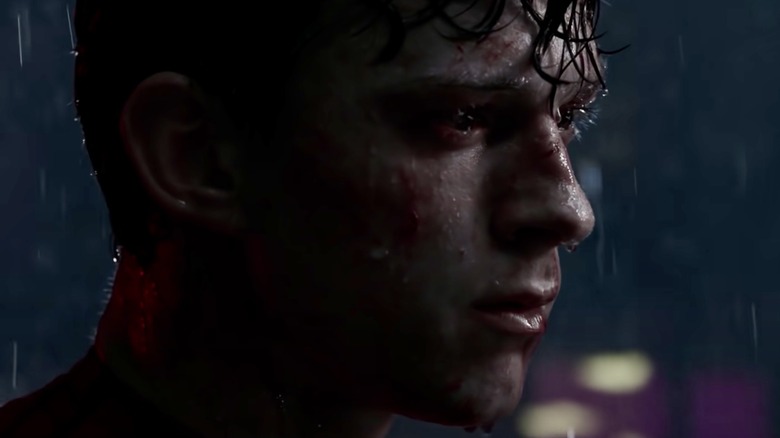Why Has Tom Holland's Spider-Man Never Been The Star Of His Own Movie?
As "Spider-Man: No Way Home" continues its theatrical rollout worldwide, more audiences are getting to experience the movie, which is really the eighth leg in the live-action Spider-Man film series, as opposed to just a continuation of Tom Holland's Spidey adventures in the Marvel Cinematic Universe. In "No Way Home," Holland, as Peter Parker, has to deal with a sudden influx of "multiversal trespassers," supervillains from Sony movies past who are now encroaching on his MCU territory. In a way, he's been preparing for this battle already by dealing with other trespassing heroes and guest stars from movies outside his solo series.
As it picks up right where "Spider-Man: Far from Home" left off, "No Way Home" hits the ground running and manages to be consistently entertaining throughout its 148-minute runtime. Holland is arguably the best Spider-Man, and with this movie, he's arguably sealed his trilogy as the best in the MCU, even perhaps the superhero film genre as a whole (though he faces some stiff competition from Captain America in that regard, and fans who weren't disappointed by "The Dark Knight Rises" may wish to throw Batman's name in the ring, as well.)
With so much going for Holland's Spidey, why does it feel like he's never truly been the star of his own movie? This question is posed not as a takedown or hot take attempt, but out of genuine curiosity. "No Way Home" leaves him poised to finally become the star of his own film, but it's taken us three movies to get here, and along the way, there's no denying that he's has had to share the spotlight with other headliners.
We're not just talking about big-gun Avengers here. To elaborate, we'll need to delve into major spoilers for "No Way Home."
Friendly Neighborhood First Act
The first act of "No Way Home" very much grounds us in the friendly neighborhood realm of Peter Parker and his classmates as they deal with the fallout of J. Jonah Jameson (J.K. Simmons) revealing Spider-Man's secret identity to the world. At this point, Peter is surrounded by supporting characters, most of whom knew him as Spider-Man even before Jameson's big reveal. He, MJ (Zendaya), and Ned Leeds (Jacob Batalon) have their own three-amigos thing going on and are hoping to get into MIT together. Meanwhile, Peter's surrogate uncle, Happy Hogan (Jon Favreau), is just hoping to get into the apartment of his Aunt May (Marisa Tomei) even as she tries to break off their fling.
There's also Charlie Cox, who shows up for one scene as Matt Murdock, the blind lawyer. Cox, of course, starred as Murdock for three seasons on his own Netflix series, "Daredevil." We get a hint of his heightened superhero reflexes when this supposedly sightless man somehow manages to catch a brick that someone has hurled through the window. Even in a first act that is largely centered on Peter and friends, "No Way Home" is not above sneaking in a cameo from another major hero.
This is all in good fun, mind you, but it goes toward illustrating a larger point. During promotions for "No Way Home," Holland said that Marvel originally wanted to market the movie as a "civil war" between his character and Doctor Strange (Benedict Cumberbatch). We get some of that in the movie early on, but Strange is mostly there to provide the catalyst or inciting incident. He casts the spell that transitions us into the second act, at which point, "No Way Home" becomes a Sinister Six movie.
Now in Theaters: Spider-Man 8
Like "The Matrix Resurrections," "Spider-Man: No Way Home" weaponizes nostalgia for past highlights as a storytelling device. Here, no less than five villains from previous "Spider-Man" movies return, yet none of them are characters that Holland's Spidey has met before because those weren't his movies. "No Way Home" isn't exactly resting on its franchise laurels, but neither does it entirely counteract the criticism that Indiewire's David Ehlrich levelled against it when he called it "a safe plastic monument to the solipsism of today's studio cinema."
So many franchises — another recent example being "Ghostbusters" — have this navel-gazing quality now where they're looking in on themselves and referencing their past entries even as their individual installments refuse to be self-contained. Instead of standalone stories, what we get are legacy sequels or mega sequels that build on our knowledge of what's gone before, and in cases like this, serve to sum it all up. "No Way Home" pulls off the balancing act better than most, but it's still, in effect, the "X-Men: Days of Future Past" of the Spider-Man franchise.
This is "Spider-Man 8." Here, various members of the gang from "6" and "7" are back, including Flash Thompson (Tony Revolori), Betty Brant (Angourie Rice), and a welcome wagon of familiar teachers and coaches. There's also one villain from each of the five pre-Holland films: Green Goblin (Willem Dafoe), Doctor Octopus (Alfred Molina), Sandman (Thomas Haden Church), the Lizard (Rhys Ifans), and Electro (Jamie Foxx). The movie almost goes and makes Spider-Man the sixth member of the Sinister Six as he traps Doctor Strange in the Mirror Dimension, invites the villains back to his apartment (technically, Happy's place), and sets about using Stark Tech to try and "cure" each of them.
An Out-of-Movie Experience
The very first trailer for "No Way Home" showed us Spider-Man having an out-of-body experience, as Doctor Strange knocked his civilian astral form out of his superhero self like Tilda Swinton's Ancient One did with Hulk in "Avengers: Endgame." That's a fitting image because there's one crucial moment in "No Way Home" where it feels like Holland's Spidey is having an out-of-movie experience.
It comes right after Aunt May has died, leaving Peter with some parting words of wisdom in the form of the comics-accurate line, "With great power, there must come great responsibility." Structurally, this is the all-important "first defeat" and/or the "all is lost" moment that marks the changeover from one half or one act to another in a conventional beat sheet. It's also a defining moment in Spider-Man's origin, one that has been missing from the Holland movies up until now as they tried to avoid rehashing that twice-told origin on the big screen for a third time.
Cut to MJ and Ned. Peter is left to grieve offscreen for the time being while his two amigos meet two other Spider-Men from the multiverse, played by none other than Andrew Garfield and Tobey Maguire. Both of these guys have such star power that for a few precious minutes, it becomes their movie and we forget about Holland altogether.
Having a scene to reintroduce them without Holland there might be necessary so that they each have a moment to shine, but going forward from here, the movie becomes a team-up between the three Spider-Men against four of the five villains, with Doctor Octopus changing sides since Peter has already cured him. Make no mistake about it: this is a full-on ensemble film where a group of supervillains fights a group of superheroes.
In the Shadow of Iron Man Graffiti
In his first solo outing, "Spider-Man: Homecoming," Holland's Spidey had Robert Downey Jr. as his co-star. Tony Stark acted as a father figure and mentor to Peter in place of his traditional role model, Uncle Ben. The shadow of Tony's death and legacy also loomed over "Far from Home," which saw Peter latching onto Jake Gyllenhaal's Quentin Beck as an ill-chosen substitute or replacement for Tony.
Think about the scene in "Far from Home" where Peter hands over Tony's all-powerful E.D.I.T.H. glasses to Beck in the bar in Prague. That scene deliberately highlights the physical resemblance between the bearded, bespectacled Beck and Tony. "No Way Home" brings in yet another bearded dude, Doctor Strange, who has a similar personality and a similar origin to Iron Man in the MCU.
The movie ends with the words, "Doctor Strange will return" and a commercial for Strange's next movie. In this case, it's a post-credits trailer, which comes on the heels of a mid-credits scene starring Tom Hardy's Venom. The opening scene of "Far from Home" and its post-credit scene were also centered on former S.H.I.E.L.D agents Nick Fury (Samuel L. Jackson), Maria Hill (Cobie Smulders), and their shapeshifting Skrull decoys. In hindsight, it's a bit weird that this ostensible Spider-Man film chose to bookend itself that way.
In another scene, "Far from Home" had Holland looking up at a huge wall with some Iron Man street art on it. His costume has been keeping him attached at the hip to Stark Tech; and with so much of his early MCU arc being tied to the larger-than-life Tony, it feels like he wasn't able to really stretch his web-wings and fly on his own even before "No Way Home."
Is One Hero Enough Anymore?
Holland's intro into the MCU came in the crowded "Captain America: Civil War," another hero's film, and one that had to devote equal time to introducing Chadwick Boseman's Black Panther, not to mention juggling the central Cap vs. Iron Man conflict and a whole host of other Avengers. At the time, some people referred to "Civil War" as "Avengers 2.5," since it served as a bridge for the team between "Age of Ultron" and "Infinity War" (rather than a true Cap solo movie).
Sequels stuffed with more than one villain have long been a recurring trend in comic book movies, with Sam Raimi's "Spider-Man 3" being one famous example in this particular series. Now, however, it feels like we have reached a point where multiple villains and just one hero is not enough anymore, either.
If there are no more movie stars who are genuinely bulletproof in terms of box-office draw, maybe the same is true for superheroes (barring only Batman, perhaps). Marvel's approach with Spider-Man goes along with the approach that it has taken with Black Widow and her Russian super-family, Thor and his "Ragnarok" Revengers, and Captain America and the real Avengers. It looks to be taking a similar approach with the upcoming sequel to "Captain Marvel," even going so far as to brand it "The Marvels" instead of "Captain Marvel 2." Wanda Maximoff and America Chavez are also joining "Doctor Strange and the Multiverse of Madness."
Every hero has their supporting characters, but in its drive to lure moviegoers to theaters, Marvel Studios has been leaning hard, as of late, into the comic book tradition of team-ups. The heroes in its movies often share double billing now with another hero, or they're surrounded by a super-team. We get a gazillion guest stars, but will there ever be a day when Spider-Man doesn't feel like a supporting character in his own movie? And will there ever be a Marvel trilogy that's legitimately self-contained and doesn't rely on a lot of outside knowledge or outside characters from other movies?
Spider-Man's Lonely Web
Overall, "Spider-Man: No Way Home" offers enough dopamine delight to stick the trilogy landing, even if it does occasionally get distracted and forget about Tom Holland or leave him off to the side. I rewatched most of the other "Spider-Man" movies this year before I did a ranking of them, so I had the movies fresh in mind and that helped bring out the emotion of certain moments in this one more.
One example of this is when MJ takes a Gwen Stacy dive and Garfield's Spider-Man swoops in to save her. Holland is about to do it before the Green Goblin — the villain he's borrowing from Maguire — knocks him out of the way, almost as if to remind him that this isn't his movie; it's their movie and he needs to share. "The Amazing Spider-Man 2" came out almost eight years ago, and if you're a casual viewer and not a comic book reader, I wonder if Garfield's moment with MJ would land the same way, since it's predicated on the memory of him failing to save Gwen (Emma Stone) in that film.
It's only at the very end, when everyone has had their memories of Peter Parker erased, that "No Way Home" hints at a future where Holland might truly come into his own as a solo Spider-Man. Watching the movie alone on my birthday in a foreign country (cue the world's smallest violin), I could relate more than usual to the idea of people forgetting you exist. Seeing Peter move into his own bachelor pad and swing away in his classic costume, it took me back to my days as a kid reading Marvel Comics, with more issues of "Amazing Spider-Man" in his collection than any other title.
There's an aspect to Spider-Man that involves him being a relatable, down-on-his-luck loser who just can't catch a break. Hopefully, Holland will catch a break next time and they'll let him be the star of his own movie. At this point, I'd almost rather watch him in his own multi-season Disney+ series if it meant they would keep it squarely focused on his title character (and, dare I say, let him face one villain per episode).
